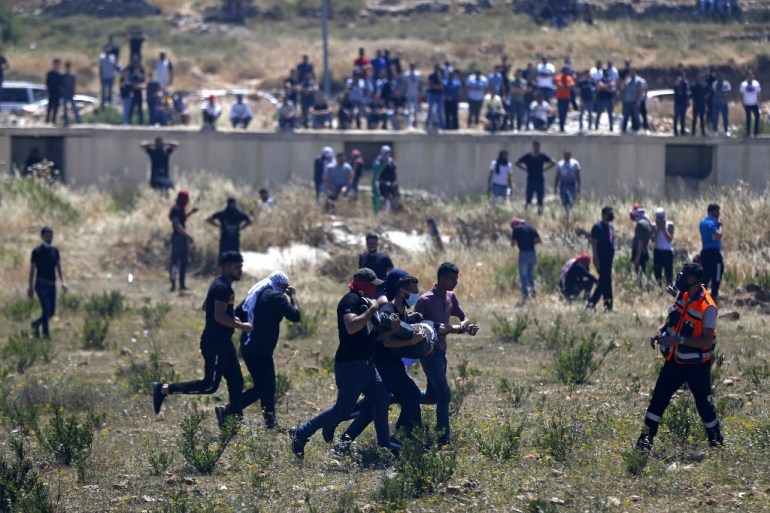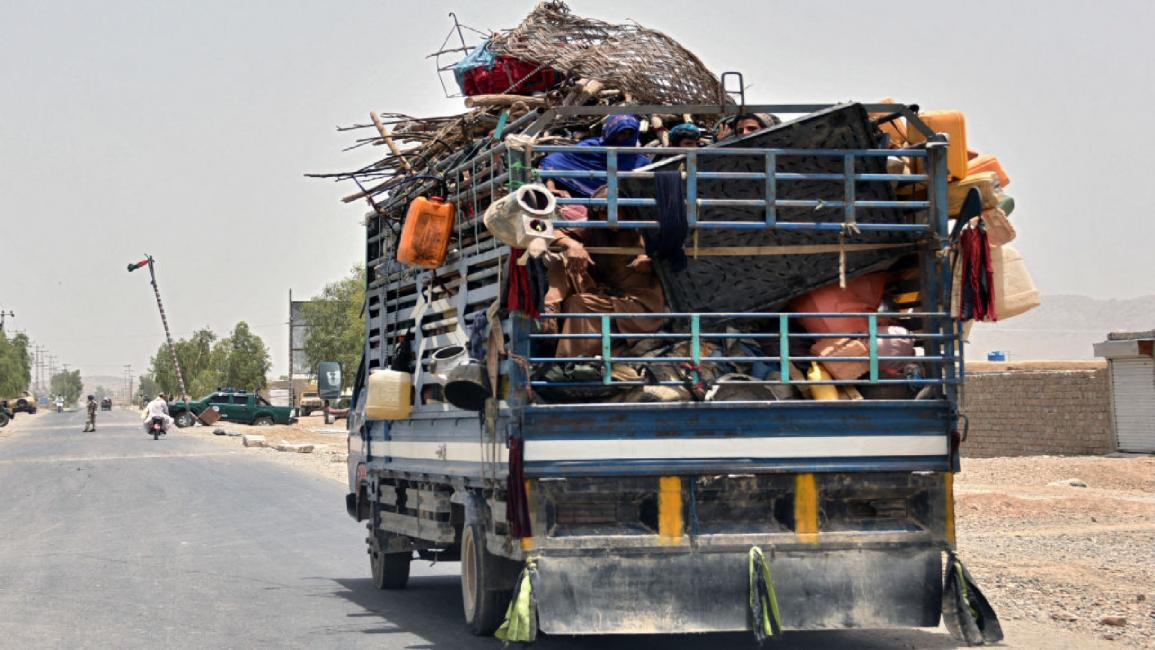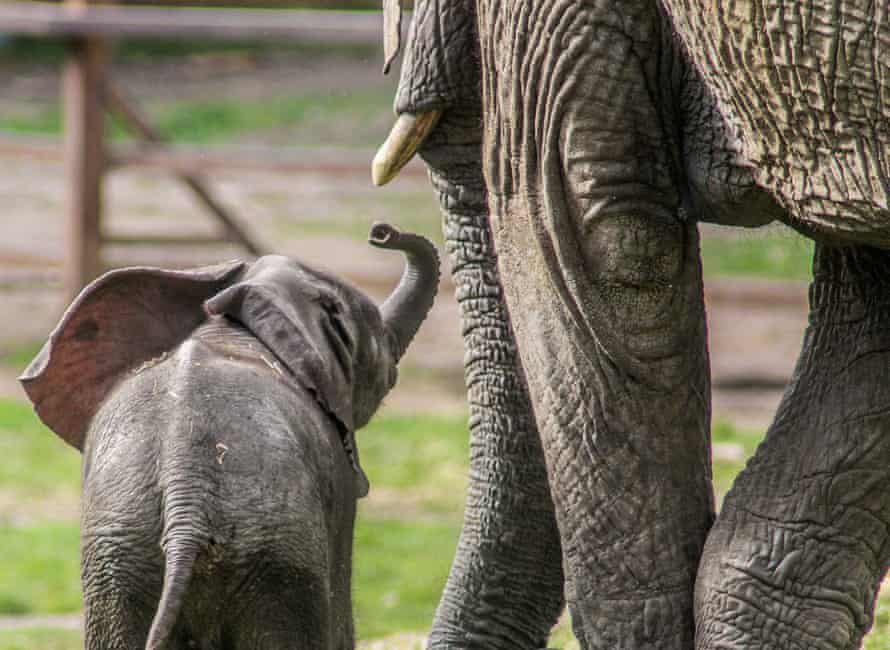The draconian law used by Israel to steal Palestinian land
Analysts say all outposts are a backdoor to keep claiming Palestinian land after Israel committed to freezing settlements in the Oslo Accords in 1993.
![Israeli soldiers stand guard as Palestinian demonstrators gather during a protest against Israeli settlements in Beita town near Nablus [Mohamad Torokman/Reuters]](https://www.aljazeera.com/wp-content/uploads/2020/07/25799bb5aff64e29bb2bc56f1a491155_18.jpeg?resize=770%2C513)
![Israeli soldiers stand guard as Palestinian demonstrators gather during a protest against Israeli settlements in Beita town near Nablus [Mohamad Torokman/Reuters]](https://www.aljazeera.com/wp-content/uploads/2020/07/25799bb5aff64e29bb2bc56f1a491155_18.jpeg?resize=770%2C513)
In early May, more than 50 Jewish families packed their bags and moved to a hilltop in the West Bank in the occupied Palestinian territory.
They quickly erected modular homes, a synagogue, a nursery, and even dug a playground to claim a piece of land they neither purchased nor inherited.
These settlers called it the Evyatar outpost, after Evyatar Borosky – a Jewish man killed in 2013 allegedly by a Palestinian.
All settlements or outposts – a backdoor to keep claiming Palestinian land after Israel committed to freezing settlements in the Oslo Accords in 1993 – are deemed illegal under international law.
The Evyatar outpost stood out because it was illegal under Israeli law, too.
Moreover, it came into existence at a time when US President Joe Biden had replaced Donald Trump and Israel witnessed a change of government to a multi-party coalition of left, right, and centrist parties
The land is also strategically located. It lies south of Nablus in an area called Jabal Sabih in the villages of Beita and Yatma that is expected to be a part of the future state of Palestine. A settlement here would break Palestinian territorial contiguity.
Last week, the settlers were finally evicted and the Palestinians celebrated it as a victory of their resistance. Analysts, however, warned that celebrations were premature and unwarranted.
Al Jazeera spoke to several experts who said the eviction did not reflect a change of Israeli policy and only displayed how the Israeli state deploys its instruments to facilitate systematic theft of Palestinian property.
Instead of being reprimanded by the state for illegally confiscating land that did not belong to them, the settlers were made a promise.
The Israeli media reported Naftali Bennett, Israel’s new prime minister and a staunch supporter of illegal settlements, offered the settlers a deal – the state would ascertain whether the land can be classified as “state land” and if yes – the conclusion the state is expected to arrive at – it would be handed over to the settlers even though it lies in Palestinian villages.
Hagit Ofran, executive director of the Settlement Watch programme at the Israeli NGO Peace Now, surmised it for Al Jazeera. “It was published: The settlers leave; the houses remain; the army puts up a military post; the government starts the process of declaring state lands,” Ofran said.
Israel legalises such outposts or settlements by deploying a draconian interpretation of the Ottoman law that if the land was not cultivated for several years in a row it would become the property of the state.
Peace Now, however, asserted the Evyatar outpost was in fact built on “private Palestinian land”, and that an aerial photo from 1980 showed parts of the land were even “cultivated” – implying it cannot hence be deemed state land.
Yet the state might just confiscate it for the settlers, as it has done hundreds of times. Israel has settled 441,000 settlers in 280 settlements on more than two million dunams – one dunam equals 1,000 square metres – of Palestinian land in the West Bank and East Jerusalem.
It has passed a series of discriminatory laws to be able to confiscate Palestinian property.
Absentee property law
Israel uses the Absentee Property Law to claim the lands it forced the Palestinians to abandon in the 1948 and 1967 wars. It also deploys a range of tactics to declare all unregistered lands – left out by the Ottoman and British occupiers and believed to be two-thirds of the West Bank – as possible “state” land.
Palestinian lands are also confiscated in the name of archaeological and tourism purposes, and if they are bought from Palestinians it is almost always through coercive measures, Peace Now noted.
According to B’Tselem, Israeli Information Center for Human Rights in the Occupied Territories, Israel grants tax benefits to settlers to build homes and to Israeli industries to set up shop in these territories. The Israeli state also encourages Jews to establish agricultural farms and enables the extensive takeover of Palestinian farmland and pastureland.
“Forty such farms have been established in the past decade, effectively taking over tens of thousands of dunams,” B’Tselem confirmed in a March report.
Anwar Mhajne, an assistant professor at Stonehill College and a political scientist specialising in international relations, said in 1968 Israel put the land registration process on hold, allowing it to label any unregistered land as state land.
She added Israeli law allows the Israeli state to confiscate private land for Palestinian public necessities, which is then passed on for settler infrastructure.
“Israel uses this law, however, to seize private land for building segregated roads to connect the settlements,” said Mhajne. “Relying on a similar law in East Jerusalem, Israel established 12 settlements in East Jerusalem.”
Mhajne added if the patch of land south of Nablus is granted the status of state land, which Palestinian experts feared is likely, it would set a dangerous precedent. It would encourage, “the settlers to construct even more illegal settlements to pressure the government to recognise them even if they are unlawful”.
Ines Abdel Razak, a member of the Palestinian think-tank Al-Shabaka and the advocacy director for the Palestine Institute for Public Diplomacy (PIPD), said many illegal outposts are in process of being legalised.
“Israel’s settler-colonial project that started a century ago has a clear goal: maximum land with minimum Palestinian people,” Abdel Razak said. “This is very clear in Jerusalem and in the West Bank today whether in Sheikh Jarrah, Silwan, or Beita.
“From the Absentee Property Law to the settlement enterprise in the West Bank, the policy and practice have been to build Jewish settlements and dispossess Palestinians from their homeland.”
 I
IIt said the Israeli state controlled 93 percent of all land, including in East Jerusalem, and has delegated the task of managing these lands to a state agency – the Israel Land Authority. But this body is dominated by the Jewish National Fund whose “explicit mandate is to develop land for Jews and not any other segment of the population”.
The report also quoted a finding from 2017 that while Palestinians make up 21 percent of Israel’s population, less than 3 percent of land falls under the jurisdiction of Palestinian municipalities.
What will Biden do?
The fate of Palestinians, caught in an unequal fight with state-backed settlers, now hinges on how Biden deals with the matter as he meets Prime Minister Naftali Bennett later this month or early next.
Will Biden pull him up and demand a settlement freeze, or will he just give him a slap on the wrist and agree to disagree?
Ofran of Peace Now said if left unchallenged by the United States, Bennet would of course want to continue with “the legalisation” of all outposts.
“The question would be to what extent the pressure from within the government and from the world will lead him to refrain from it,” Ofran said.












